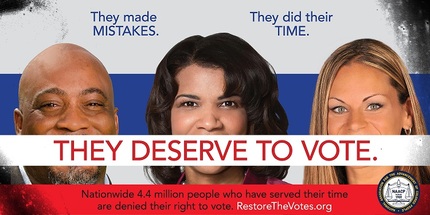Today, nearly 4.4 million people in America have families, own homes and have even started their own businesses. They are pursuing the American Dream with one exception -- they cannot vote. Felony conviction laws are blocking them from the ballot box. This barrier to full participation in our country's democracy underscores why felony disenfranchisement is as much an international issue as incarceration rates and prison reform. On December 10th -- Human Rights Day -- we must continue to make this injustice visible.
It is no secret that the U.S. is home to more than 2.4 million prisoners, surpassing countries like Russia, Brazil, and South Africa combined.
The data becomes even more jarring when broken down by race. Blacks, who constitute roughly 13 percent of the U.S. population, account for 38 percent of the prison population by state. Hispanics, who make up 17 percent of the U.S. population, account for 21 percent of the state prison population. Whites, who account for about 78 percent of the country's population, only make up 35 percent of the prison population.
These disparities are rooted in systemic failures that include faulty policing policies and skewed sentencing guidelines.
The collateral consequences of our nation's prison culture are far-reaching as they break up families, increase poverty, restrict education, criminalize youth and cause fissures in our democracy.
Laws preventing returning prisoners from voting originated prior to the Reconstruction era in an attempt to stem the growth of the black voting bloc and black electorate. Today, the effects are the same. The latest data reveals that nearly six million people cannot vote because of felony disenfranchisement laws practiced in across 48 states and the District of Columbia. More than two million of those disenfranchised are black.
Florida, Kentucky, and Iowa practice permanent disenfranchisement, erecting impenetrable barriers for people who are no longer incarcerated. Virginia made some strides after an executive order this summer granted automatic restoration of rights to people with non-violent felony convictions; however, that order's future will rely on the Governor-elect's agenda beginning in 2014. Kentucky and Iowa are slowly embracing change, but until those laws are amended in their state Constitutions, like this year's history-making legislation in Delaware, each state is still behind the curve.
For decades, the United Nations has recognized that the right to vote and the right to be free from discrimination as integral components of our international system. This is why groups like the NAACP, The Sentencing Project, and the ACLU have made continuous efforts to highlight how felony disenfranchisement laws violate these principles and our country's international obligations. This year the United Nations Human Rights Committee signaled that felony disenfranchisement practices would be a priority during a March 2014 review of the United States' obligations to the International Covenant on Civil and Political Rights.
Additionally, a growing number of nations have supported UN resolutions inclusive of language calling on countries to ensure that all citizens are granted the right and opportunity to vote regardless of incarceration status.
This is progress. But without a federal law, we are at the mercy of our states to join the international landscape. And, while we see progressive movements in states like Virginia, Delaware, Iowa, Kentucky, and Minnesota we also see signs of regression in states like North Carolina under the umbrella of other voter restrictions.
Any regression can be reversed if the dialogue continues. But conversations on prison reform and the United State's prison culture must include the unnecessary restriction of voting rights for people that have paid their dues to society. So far, the United Nations is leading the way, and they are waiting for the rest of us to follow.

